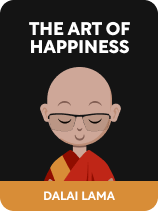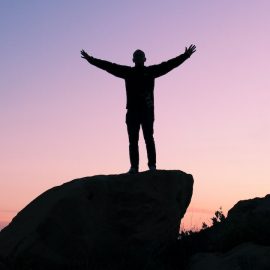

This article is an excerpt from the Shortform book guide to "The Art of Happiness" by Dalai Lama. Shortform has the world's best summaries and analyses of books you should be reading.
Like this article? Sign up for a free trial here .
Do you practice spirituality? Is it true that people who practice spirituality tend to be happier than those who don’t?
There is a strong positive correlation between practicing spirituality and happiness. Studies have shown that those who have spirituality or religion in their lives tend to be happier and less depressed and anxious than those who don’t.
Keep reading to learn about the importance of spirituality.
Weave Spirituality Into Your Daily Life
In The Art of Happiness, the Dalai Lama emphasizes the importance of spirituality in your day-to-day life. Practice whatever form of spirituality you subscribe to, he counsels, whether it is a religious spirituality, guided by the tenets of a religion, or a secular spirituality, guided by the values of kindness, compassion, and so forth.
(Shortform note: There’s debate over whether Buddhism itself is a religion or a philosophy. Those who believe it’s a religion do so because Buddhism, like other religions, proposes that there’s a single, true reality (Nirvana). Those who believe Buddhism is a philosophy argue that Buddhism doesn’t propose a single reality, but rather some testable propositions to eradicate suffering from your lie.)
Regardless of the type of spirituality you practice, what matters, according to the Dalai Lama, is the extent to which you action the positive elements of your spirituality. Actioning requires a calm mind and discipline. Let’s talk about these elements one at a time.
(Shortform note: Actioning your spirituality through calmness of mind and good discipline is similar to James Clear’s approach to habit-formation. In Atomic Habits, he argues that to develop a habit, remove the barriers to performing the habit in advance. The Dalai Lama’s approach is similar: Prepare your mind in advance so that acting on your spirituality becomes easy in the moment.)
Develop a Calm Mind
To weave spirituality into your life, develop a calm mind, recommends the Dalai Lama. When your mind is calm—undisturbed by distracting negative thoughts and emotions—you see clearly what’s going on and can use your spiritual teachings effectively.
(Shortform note: The Dalai Lama doesn’t specify what it means to “see clearly what’s going on.” It makes sense, though, that he means recognizing The Four Noble Truths and then pursuing the Noble Eightfold Path that leads to the end of suffering. We might also simply take this to mean understanding everything we’ve been discussing in this guide: the importance of a happiness mindset, interpersonal relationships, acceptance of suffering, and so on.)
Let’s say you’re planning a party for a friend. You’re overwhelmed by thoughts of all the tasks still to do and a feeling that you’re putting in a lot of work for someone who won’t be grateful. Your un-calm mind prevents you from seeing the reality of the situation: that your thoughts about the tasks, not the tasks themselves, are causing you to suffer. When you recognize this, you can implement the practice of shifting your perspective to eliminate suffering.
Develop a Calm Mind by Meditating
To develop a calm mind, the Dalai Lama recommends meditation but adds that most religions have their own practices for this and that practitioners of a specific religion can perform those.
(Shortform note: Buddhists advise visualizing the un-calm mind as a container of dirty water. With dirt and debris in it—representing thoughts and feelings—the water is unclear, and you can’t see through it. But when you let the dirt settle at the bottom of the glass—either by letting the mind settle naturally or by meditating—the water becomes clear and you can see it as it is.)
The Dalai Lama’s meditation for developing calmness of mind is as follows:
- Connect to your motivation to experience your mind neutrally.
- Draw your attention away from outside distractions, like sounds, and inside ones, like thoughts.
- Don’t simply tune out, though: Remain alert, trying to experience your mind as it exists in its purest form, un-preoccupied with distracting concepts or objects.
(Shortform note: The meditation the Dalai Lama outlines here is best categorized as Vipassana. Vipassana translates to “clear seeing.” In this meditation, you learn to experience your mind and the world without filters. This experiential practice stands in contrast to learning about or knowing something intellectually—for instance, learning about the concept of impermanence from a teacher. In Vipassana, you experience impermanence: You experience how your thoughts come and go and your mind is inherently clear.)
Develop Disciplined Thinking
The second recommendation for weaving spirituality into your life is to be disciplined about implementing your spiritual learning, says the Dalai Lama. In every situation, take the three steps to cultivate your happiness mindset, work to eliminate suffering, and build strong relationships.
Let’s say someone on the subway is invading your personal space. If you’re disciplined, you first sense that your ire is being provoked and ask yourself why you’re angry—in other words, you educate yourself. Then, you connect with your motivation to change for the better: You determine that you wish to be free of this anger. Finally, you exert yourself to change by, for instance, combating your anger with compassion toward the person or by changing your perspective on the situation to see its benefit to you.
(Shortform note: In other realms of life, discipline can lead to greater happiness and, argue Jocko Willink and Leif Babin in Extreme Ownership, greater freedom. This is because when you’re disciplined enough to stick to a schedule and goals, new opportunities open up to you. Perhaps by being a disciplined gym-goer, you gain greater freedom from having a stronger body. Similarly, if you have the discipline to take the three steps toward a happiness mindset in every situation, you don’t automatically leap to negative reactions and have more freedom to maneuver.)

———End of Preview———
Like what you just read? Read the rest of the world's best book summary and analysis of Dalai Lama's "The Art of Happiness" at Shortform .
Here's what you'll find in our full The Art of Happiness summary :
- The Dalai Lama's Buddhist path toward happiness
- The use of scientific evidence to support the Dalai Lama's beliefs
- Concrete actions you can take to improve your outlook on life, relationships, and resilience






